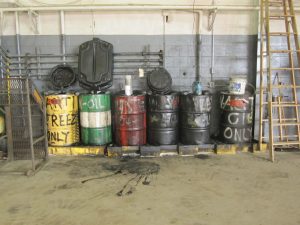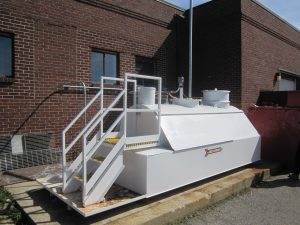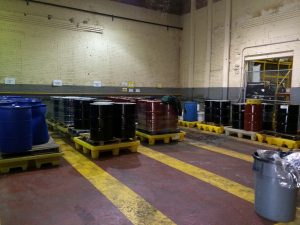Spill Prevention, Control, and Countermeasure (SPCC) Plans
All too often, facilities that store potentially hazardous chemicals are ill-prepared to respond to a leak or spill. In effort to protect the health and safety of site-employees and the environment, a site-specific, regimented petroleum bulk storage protocol allows an owner or operator to quickly determine a course of action when facing a chemical release. Spill Prevention, Control and Countermeasure (SPCC) Plans describe release-response measures and outline best-practices to prevent these incidents from occurring at their site.
Regulatory Background
A Spill Prevention, Control and Countermeasure (SPCC) Plan is a document which is intended to help facilities prevent a discharge of oil into navigable waters of the U.S., adjoining shorelines, and/or soils and groundwater. It includes an up-to-date inventory of Petroleum Bulk Storage (PBS) at a facility and provides site-specific guidance for preventing, controlling, containing, and responding to a petroleum release. Applicability and requirements for SPCC Plans are defined in Title 40 of the Code of Federal Regulations (40 CFR) Part 112 – Oil Pollution Prevention.
 Does My Facility Need an SPCC Plan?
Does My Facility Need an SPCC Plan?
A non-transportation-related facility (on-shore or off-shore) is required to prepare and uphold a SPCC Plan if it maintains a total aboveground petroleum storage capacity greater than 1,320 gallons or a completely buried (underground) storage capacity greater than 42,000 gallons. Transportation-related facilities are those with primary functions to transport oil (petroleum products) from one location to another. Only storage containers with a minimum capacity of 55 gallons are counted towards this total. Oil of any type and in any form is subject to the Oil Pollution Prevention regulations (which define the SPCC Rule), including but not limited to crude oil; refined petroleum products such as gasoline, diesel, kerosene and fuel oil; jet fuel; waste oil; cooking oil; animal fats; fish oils; vegetable oils including oils from seeds, fruits, nuts and kernels; and certain automotive fluids such as motor oil and lubricating oils. A facility is subject to the SPCC Rule if it stores, produces, consumes, processes, refines, transfers, or distributes petroleum products of such type and quantity.
What Material Does an SPCC Plan Cover?
A SPCC Plan includes an evaluation of potential discharge routes at a site and receptors which may be impacted by a petroleum release, and introduces means by which to prevent and/or mitigate the effects of a spill. This can be accomplished with routine inspections of petroleum storage containers and associated equipment to proactively identify evidence of leakage or failure; installation of secondary containment structures; use of spill response materials such as booms, barriers and sorbents; and training of facility personnel in the operation of pollution prevention equipment, discharge procedure protocols, and applicable pollution control laws.
Petroleum Bulk Storage Consultants
Pre-emptive action and preparedness can save a facility operator lots of resources in the event of an oil discharge. Walden Environmental Engineering provides a variety of services related to petroleum bulk storage, spill prevention and spill response.
Call us at (516) 624-7200, (845) 253-8025, or (518) 320-8312 for a free consultation to discuss any of your PBS issues or any of the other environmental engineering services we offer.
Interested in cutting down on the amount of petroleum stored at your facility? Try disposing chemical drums that no longer serve a purpose at your facility in an environmentally responsible way.
If your business stores petroleum in New York City, make sure you also file with the NYC Department of Environmental Protection under their Right to Know Program.



